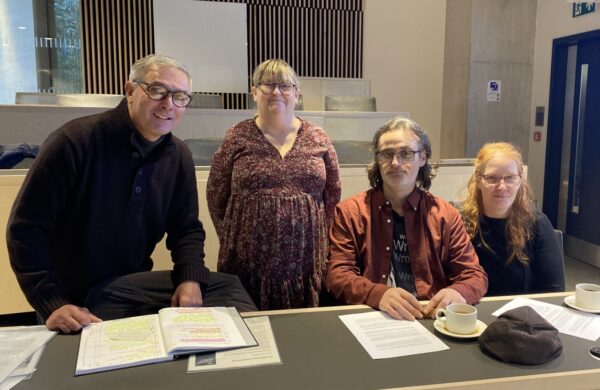Where are the margins?
A report from our 30 April online discussions on what it means to be church on the margins during the pandemic.
Reflection by Stef Benstead
What groups of people are on the margins? [people who lack the resources to change their situation]
- People with disabilities (currently difficult to access care)
- Travellers
- Migrants
- People suffering domestic abuse
- Children experiencing abuse
- People in care centres (cut off from society)
- People in food poverty
- LGBT+
- Homeless (new homeless in London – hospitality workers)
- Single parents
- People who are isolated/alone
- People with no access to technology
- Trans people
- People who have had difficult experiences of church
- People who are ‘othered’ – people who are talked about, not to.
- Black and minority ethnic people (disproportionately affected by the virus)
- Women
- Digital exclusion
- Addicts
- Prisoners/ex-offenders
- Destitute asylum seekers
- Sex workers (especially in current crisis)
- Individuals and families on zero-hours contracts, on the breadline
What causes marginalisation?
- Social and economic systems exclude people, e.g. education. … the structures of our society create margins.
- We need to aware that people may be labelled as marginalised and don’t want to be labelled as such.
- The church has gone online but disabled communities have been ‘doing and being’ church online for years, having been excluded from ‘mainstream’ church.
- How does the church marginalise? Is the church at the centre?
- We can learn from the methods of the Poverty Truth Commission. Church leaders can learn from a PTC – hear the experiences of people in poverty.
- Maybe the church needs a (Poverty) Truth Commission – the meeting of leaders and church members to share experiences and talk honestly about church. An opportunity for people to be heard.
- The church is not marginalised. …. The priest is ‘in charge’.
- For some the economic gap has drastically narrowed. People have suddenly found themselves in difficult situations.
- Some people are unwilling to engage with technology and so are cut off from online activity and community.
- Some people have to comply with systems to get what they need (e.g. PIP), others (richer and powerful) do not have to comply.
- Jesus crossed borders, challenged what was socially acceptable.
How could you move to live, work, be alongside people on the margins?
- ‘We need to go to people on the margins, not wait for them to come to us.’
- We need to adopt relational approaches, befriend people where they are (not expect them to come to church).
- Meet in informal settings, e.g. pubs and cafes.
- Meet online, where many marginalised communities already gather.
- Listen to people who are angry and hurt.
- Admitting our mistakes when we get it wrong (as a church).
- Connecting with LGBT+.
- Bring people together for a shared meal (e.g. people from low-income and more affluent communities).
- Some (Anglican) churches are struggling with ‘resources churches’ taking over in their local area, lots of funding allocated to resource churches.
- Work with local people who have good local knowledge and skills (e.g. Sikh shopkeeper who knows the neighbourhood very well, helping with food provision).
- Some church leaders/hierarchy are currently advising clergy not to deliver food, etc. other people in the community are just getting on with it.

Research and Information Officer
Activists work to shape policies of the future
Change happens when people come together to make it happen. Activists with experience of poverty have been doing just that, with three UK universities. Members …
Are churches losing faith in low-income communities?
Broomhall Centre, Broomspring Lane, SheffieldThursday 29 May 2025, 7:30pm – 9:30pm Churches across Sheffield are being asked to take a long hard look at the …
Church Action On Poverty North East 2025 AGM
You’re invited to attend the AGM of our local group in the North East, with speaker Amanda Bailey, Director of the North East Child Poverty …
We’re listening!
Read some findings from our 2024 survey and in-depth conversations with partners and supporters.
Briefing: New Government data further undermines its cuts to UK’s vital lifelines
The Government’s own statistics show that disabled people are already three times as likely to be living in food insecurity Church Action on Poverty briefing …
The church must be at the heart of the mishmash of local life
What are the challenges and opportunities in your neighbourhood? And where does your church fit in? Those are two of the questions that people at …
Volunteers needed!
Could you help us reach out to supporters and churches for the next Church Action on Poverty Sunday?
Urgent: Ask your church to display this poster on Sunday
Churchgoers are urged to speak up against the Government’s harmful and immoral cuts to vital lifelines. Please, join the calls. The Government is proposing to …
Activists work to shape policies of the future
Change happens when people come together to make it happen. Activists with experience of poverty have been doing just that, …
Are churches losing faith in low-income communities?
Broomhall Centre, Broomspring Lane, SheffieldThursday 29 May 2025, 7:30pm – 9:30pm Churches across Sheffield are being asked to take a …
Church Action On Poverty North East 2025 AGM
You’re invited to attend the AGM of our local group in the North East, with speaker Amanda Bailey, Director of …

